Six Senses Punakha resort in Bhutan: luxury in the the Himalayas
This resort is one of five luxury properties by Six Senses in Bhutan and is an experience that will never be forgotten.
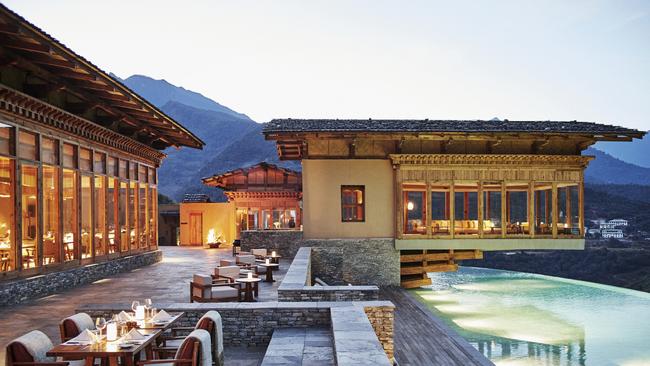
The first time the room goes dark, I’m sure it’s me, a luddite around modern hotel lighting menus. But no switch works, so I call the front office, and just as it’s answered, boom, we’re back in business. “Sorry, Mr Jeremy,” the receptionist says. “This happens sometimes.”
The second time, I’m less perturbed, yet my waiter at the restaurant at Six Senses Punakha resort in Bhutan swings into action, arriving with his phone aglow so I can continue my dinner. This seems over-indulgent, even for a property, the whole country in fact, where the level of service rarely fails to surprise, and I try to politely explain that I’m happy to be kept in the dark, having conveniently not let go of my glass of Bordeaux, until normal service is resumed which, as it happens, is 10 seconds later.
For its Punakha property, Six Senses has claimed the high ground, snuggled above rice terraces in a lush valley, and if an occasional blackout is the price of splendid isolation, so be it. You see nothing of the resort until arriving at a paved concourse where, as a drummer beats out a greeting, there’s a traditional offering of a yellow khatat or scarf and some tea, not Bhutan’s hallmark yak butter brew but an enlivening blend of eucalyptus, ginger, mint and honey.
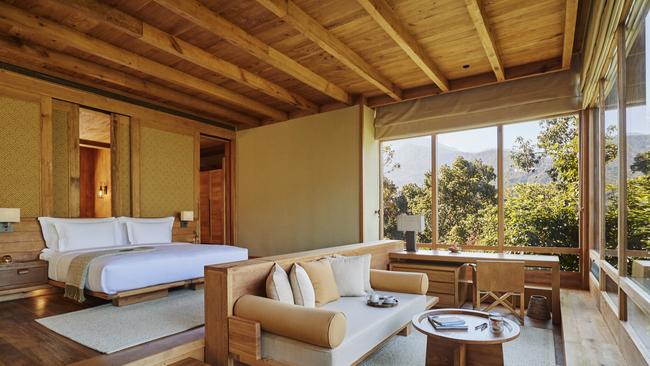
The resort’s lodges are dotted across the hillside, and I’m led into its Flying Farmhouse, a lounge with glass on three sides – four actually, as a glazed section of floor looks into the outdoor horizon pool over which it’s suspended. To complete the welcome, I receive a neck and back massage, five minutes of tension-relief after the zig-zag drive up the hill.
With 16 suites and three villas, Punakha is the mid-size model in Six Senses’ Bhutan range, one in each of five valleys in the west of this mountainous kingdom.
The suites, with either deep terraces or balconies, sit in blocks of four, two up and two down, and mine is upstairs and against the forested hillside, flowering chestnuts giving off a heady aroma.
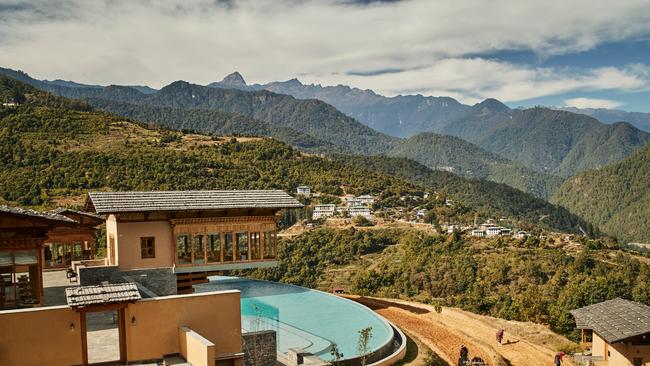
The property’s architect is a local and its style is a straight lift from the villages all around, featuring rammed-earth walls and shingle roofs, with lots of exposed wood inside and out. Suite guests wallow in 67sq m of refined simplicity, with timber floors and ceilings and muted furnishings. The sleeping quarters sit two steps up from a generous lounge, the seating arranged to take in the vast view. A console separating the two areas hides the TV, which can be produced at the touch of a button. The ensuite is also heavily timbered, with marble touches.
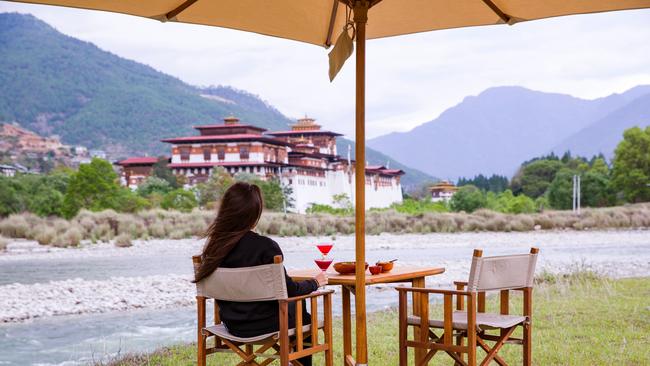
Awaiting me on a table is an array of nibbles: two mangoes and jars of dried fruit – orange, papaya, peach – and beetroot plus chocolate bark. I sample them all, generously, and each is magically replenished every time the level drops. As is the bottled water, sourced from the resort’s “water plantation” that filters and purifies the output of a local spring.
Besides its main restaurant Ari, there’s the Nobgang Rice Terrace Dinner, a full-on degustation of 14 Bhutanese dishes served in a pavilion above the paddies. It’s mild out but they have a fire going, plus pashminas and heated wheat bags if needed. The warmth is also boosted with a glass of ara, Bhutan’s grain alcohol, and ezay, the chilli paste that accompanies almost every meal in this country. The ezay arrives deconstructed, nine small bowls containing the chilli peppers, onion, tomato, various herbs and peppercorns, all of which a chef tips into a scooped-out tree stump (the mortar) and grinds with a club-sized pestle, a process at which we’re all invited to participate.
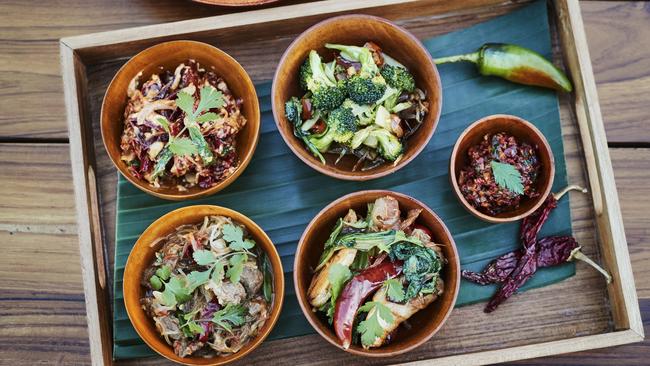
The resort’s 17 chefs turn their hands to all manner of local, regional and Western dishes, so in Ari I mix and match. There’s warm naan and a green pea and pomegranate dip, then high-end versions of momos, Bhutan’s ubiquitous dumplings. A Scottish salmon fillet, arriving just before the lights depart, is rich and faultless. Banana ice cream, like the hazelnut praline of the night before, is pleasant enough. You don’t come to Bhutan for dessert.
The days are filled discovering this fascinating valley. Six Senses arranges hikes to a hillside monastery for meditation and breakfast, white-water rafting (which on the spring morning I go out is a mere paddle) and a cellar-door experience Bhutanese-style, at the farm of Am Passang, the local master ara distiller who’s been making his wheat and corn-based spirits for more than 20 years.
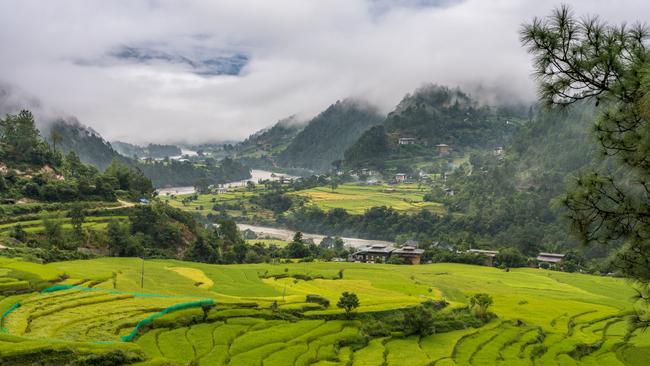
But in this most spiritual of nations, the greatest fascination is the temples, monasteries and fortresses, which are often the one entity known as a dzong. Punakha, the former capital, is still the religious power base, and the dzong is its headquarters. On any given afternoon, Six Senses commandeers a picnic spot just across the river from this formidable building for the Sunset Martini Experience, although the actual sundowner is a cosmopolitan that blends Bhutan wheat vodka with pomegranate and house-made orange liqueur. Again I’m being indulged, as three staff attend to me, erecting a temporary gazebo under which they serve up rice paper rolls and peanut marsala with papadums, as well as topping up my cosmo. And once again I’ve jinxed the lights, with the rain clouds eliminating any chance of a glowing descent behind these marvellous mountains.
In the know
Six Senses Punakha is a 3½-hour drive from Paro International Airport and 2½ hours from the capital, Thimphu. Suites from $US1595 ($2410) per night. The three villas, with one, two and three-bedroom layouts, are from $US1995 ($3015) to $US5450 ($8240). Rates include all meals, non-alcoholic beverages and laundry. The three villas each have a plunge pool, and multi-roomed villas feature private treatment rooms and courtyards. The main spa has four treatment rooms, two meditation salas and a fitness centre. Given local logistical and bureaucratic requirements, Six Senses can arrange flights, transfers, visas plus a private guide and driver, devising itineraries that take in more of its Bhutan properties.
Jeremy Bourke was a guest of Six Senses.
If you love to travel, sign up to our free weekly Travel + Luxury newsletter here.

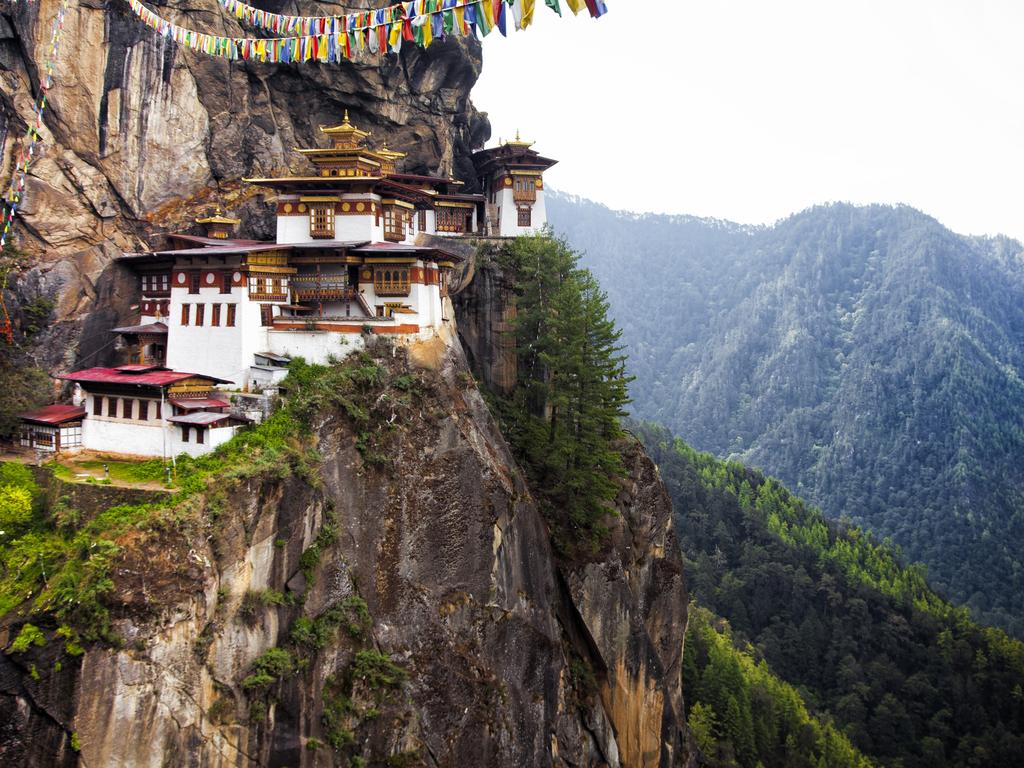
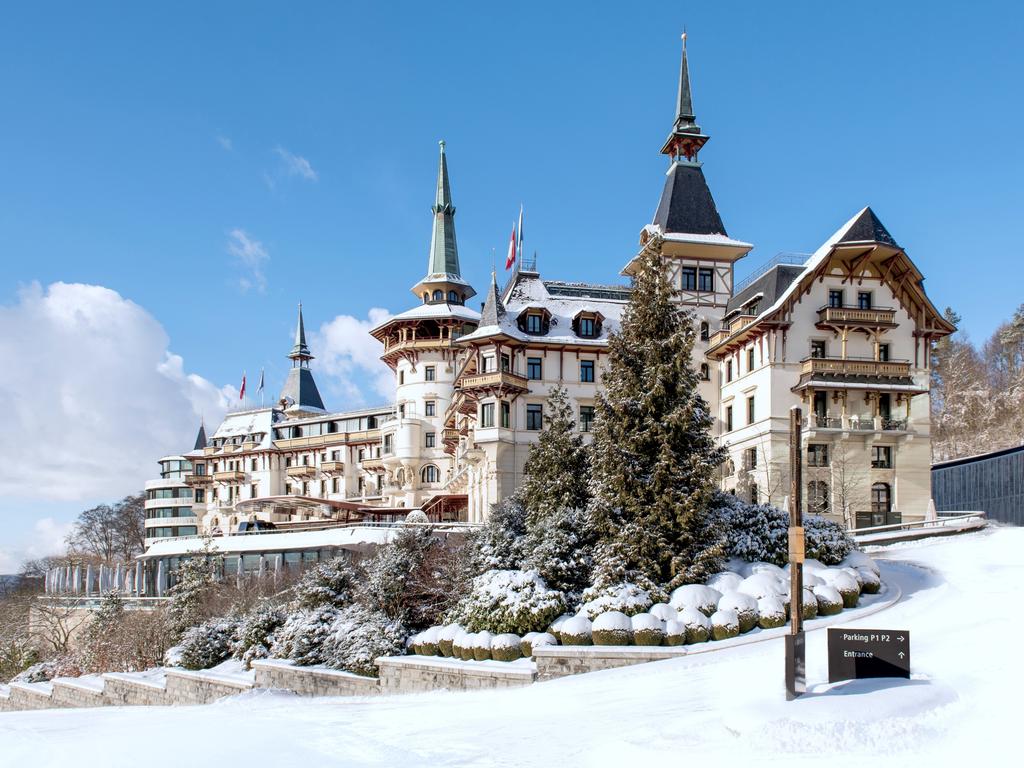
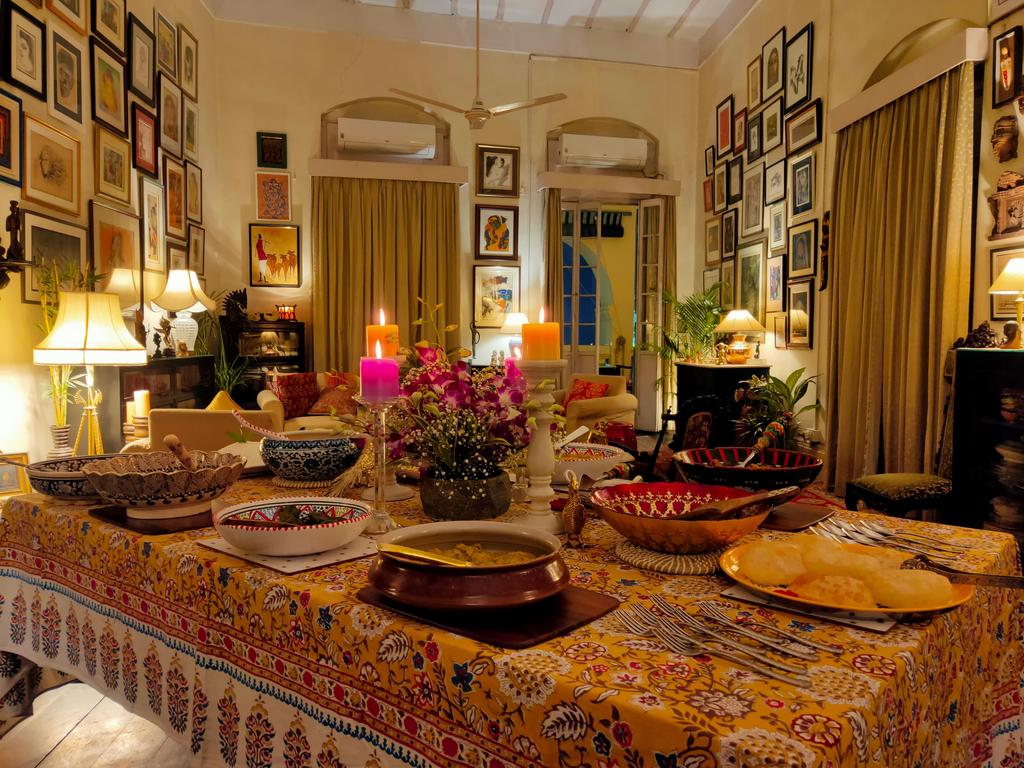
To join the conversation, please log in. Don't have an account? Register
Join the conversation, you are commenting as Logout